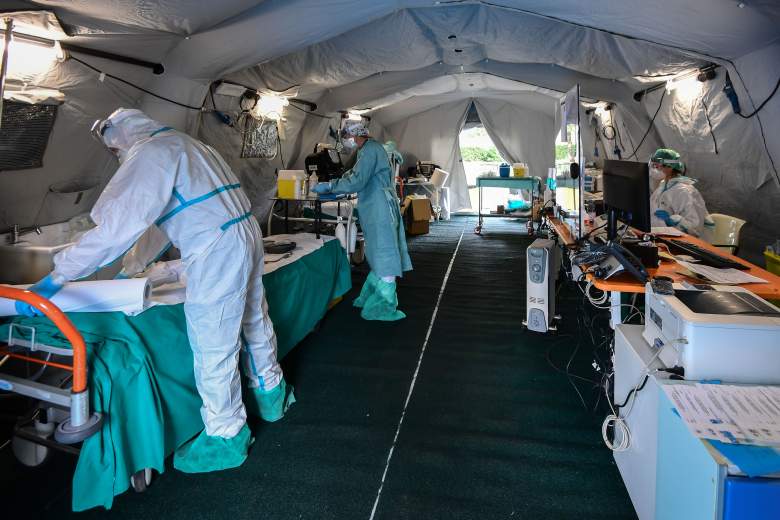
Photo by MIGUEL MEDINA/AFP via Getty Images Hospital workers wearing protective mask and gear work in a patients' triage tent at a temporary emergency structure set up outside the accident and emergency department, where any new arrivals presenting suspect new coronavirus symptoms are being tested, at the Brescia hospital, Lombardy, on March 13, 2020.
If a sudden “spike” in the number of COVID-19 coronavirus patients in the United States is really on its way, then the lessons learned in Wuhan, China and northern Italy strongly suggest that authorities will soon be searching for temporary hospital space as existing Intensive Care Unit beds rapidly fill up, overwhelming the existing critical care system.
States and cities could turn to their existing stock of school buildings and even commercial hotels and motels in order to rapidly set up mass treatment facilities and, in extreme cases, might even follow the lead of China which turned the playing floors of large indoor stadiums into warrens of office-cubicle-like temporary care spaces for coronavirus patients.
New York Governor Mario Cuomo has written an open letter in the New York Times calling for President Trump to put the Army Corps of Engineers in charge of finding buildings that can be turned into temporary hospitals – places like existing military buildings, closed prisons, shopping malls and even college campuses – and converting them quickly to house patients who would normally be treated in their local hospitals.
“States cannot build more hospitals, acquire ventilators or modify facilities quickly enough,” the governor wrote, “At this point, our best hope is to utilize the Army Corps of Engineers to leverage its expertise, equipment and people power to retrofit and equip existing facilities — like military bases or college dormitories — to serve as temporary medical centers. Then we can designate existing hospital beds for the acutely ill.”
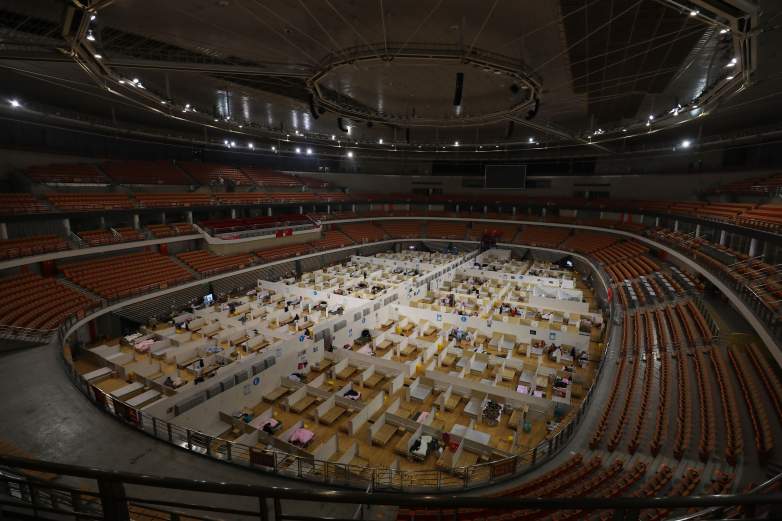
Photo by STR/AFP via Getty ImagesThis photo taken on March 5, 2020 shows a temporary hospital set up for COVID-19 coronavirus patients in a sports stadium in Wuhan, in China’s central Hubei province. – Many patients have been discharged after treatment at the temporary hospital, leaving some beds empty.
As recreational travel and other non-essential trips grind to a halt inside the United States lots of hotel and motel space is suddenly opening up and that may well be where authorities look to place any “surge” of patients if, as some mathematical models predict, the coronavirus pandemic in the US “peaks” mid-summer or as late as October in some scenarios.
With many colleges having already cancelled face-to-face classes and told their students to not bother coming back for their spring term, asking them instead to stay home and attend college on-line until further notice, there are, at least in theory, a lot of students’ rooms available at hundreds of schools, many of them near existing medical facilities. Dorms rooms could be converted into patient care rooms if the existing inventory of hospital beds in the United States is overwhelmed in the next few weeks and months, a once unthinkable prospect which is occurring in real time within the otherwise thoroughly modern healthcare system that had been operating smoothly in Northern Italy before the sudden appearance of COVID-19.
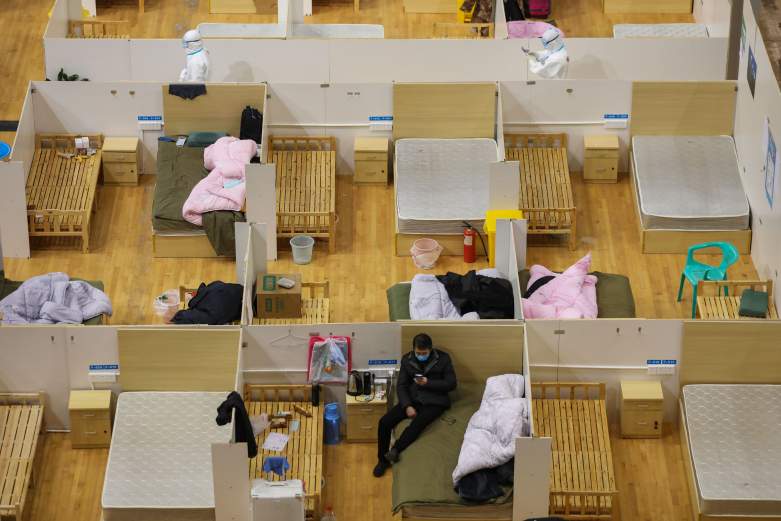
Photo by STR/AFP via Getty ImagesOn March 5, 2020 a medical worker walks past empty beds as a patient rests at a temporary hospital set up for COVID-19 coronavirus patients in a sports stadium in Wuhan, in China’s central Hubei province.
The Military has Impressive Field Hospitals That can Deploy Worldwide in 72 Hours
While the Army, Navy and Air Force all have state-of-the-art military field hospitals that can be flown in and set up anywhere on the globe in as little as three days’ time, most of the equipment associated with them amounts to overkill for COVID-19 patients who are at worst going to need respiratory support, such as ventilators, and not surgery for the kinds of severe multi-trauma injuries that would be found on a battlefield. While much of the military’s mobile medical equipment is beside the point for this particular virus, the same personnel who staff the Army’s medical brigades and those of the other service branches already have extensive training and experience in managing potential disease outbreaks among troops and those skills do match up with the current pandemic .
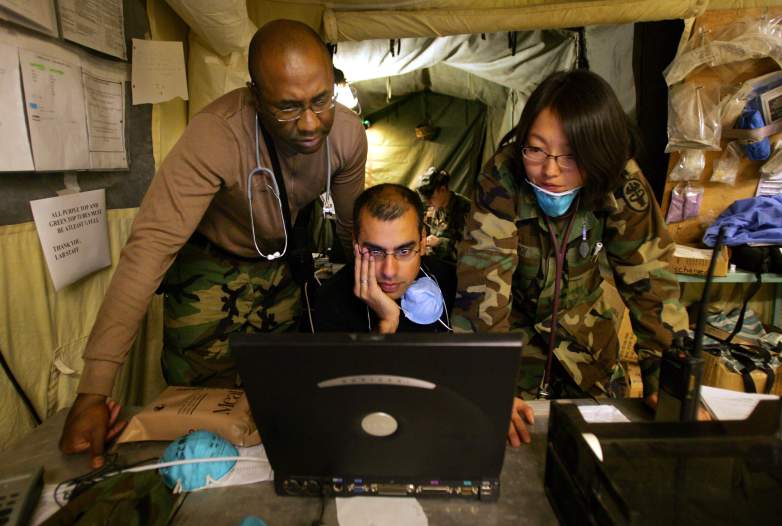
Photo by Paula Bronstein/Getty ImagesDr. Eric McDonald (L), with 212 MASH, U.S Air Force with the 435th medical Group Dr. Fareed Sheikh (C) and Dr. Mary Choi (R) study the computer for medical information at the U.S. Army Mobile Army Surgical Hospital (MASH) November 6, 2005 in Muzaffarabad, Pakistan.
National Guard troops have already been called up by several states to assist with the coronavirus “hot spots” around the country but the prospect of also involving active duty armed forces was brought up Sunday night by former Vice President Joe Biden during his televised presidential primary debate with Senator Bernie Sanders. Biden suggested the Army has the capability of setting up “One hundred bed or 500 bed hospitals” in a hurry, like they did during the Obama administration’s successful effort to halt the Ebola outbreak in Western Africa; however, it is more likely, given the nature of the care that is going to be needed for COVID-19 patients, that the military will end up sending their medical personnel into existing buildings converted temporarily into hospital spaces rather than constructing new facilities from the ground up.
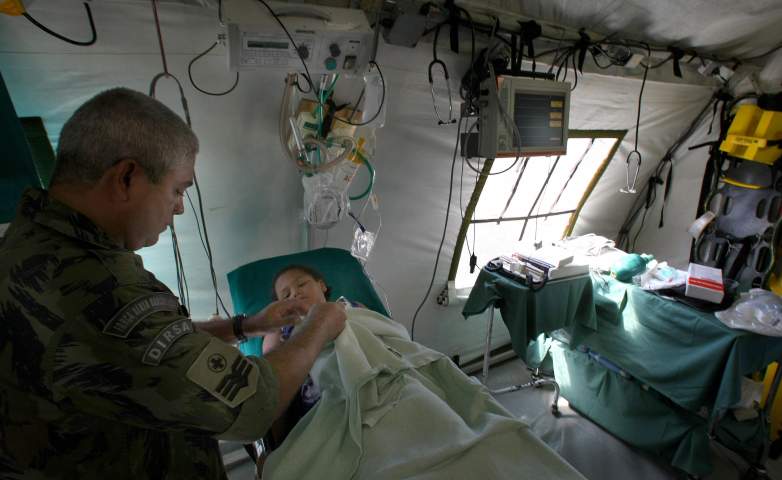
ANTONIO SCORZA/AFP via Getty ImagesSuspected of being affected by dengue fever of the hemorrhagic sort, six-year-old Jessica Abreu da Silva receives medical treatment at an Air Force field Hospital on March 31, 2008, in Barra da Tijuca, 45 kilometres west from downtown Rio de Janeiro, Brazil.
Hospitals Have Already Begun Delaying Elective Procedures Citing Supply Shortages
Hospitals including the Dartmouth-Hitchcock Medical Center, which is New Hampshire’s largest employer, have begun delaying elective medical procedures due to “a nationwide shortage of critical supplies.” Efforts are underway in hospitals across the country to keep beds open for patients who are arriving in ever increasing numbers with COVID-19.
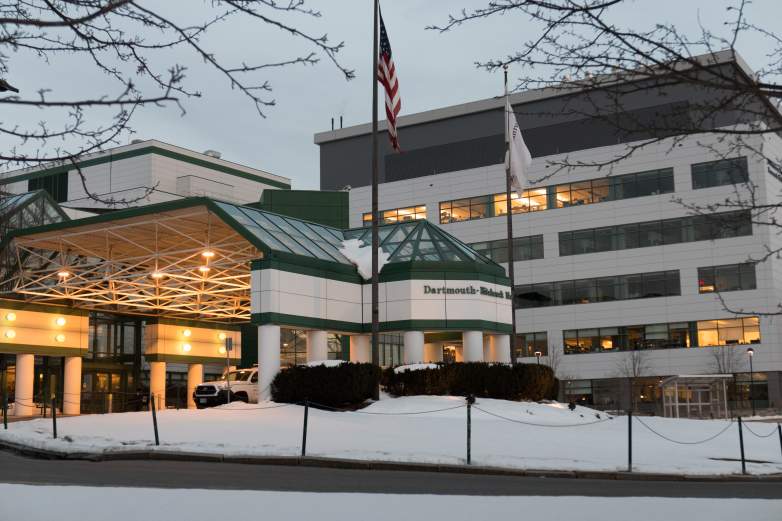
Eric FrancisTwo employees of the Dartmouth Hitchcock Medical Center in Lebanon, New Hamsphire tested positive for the COVID-19 coronavirus early on in the epidemic but the hospital says they were not in contact with any patients